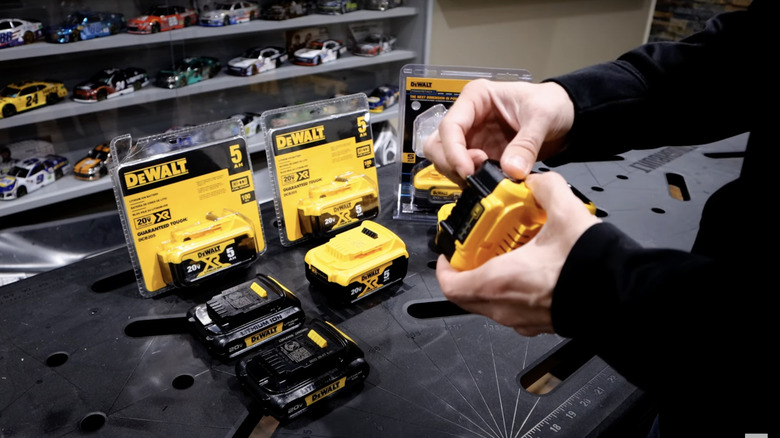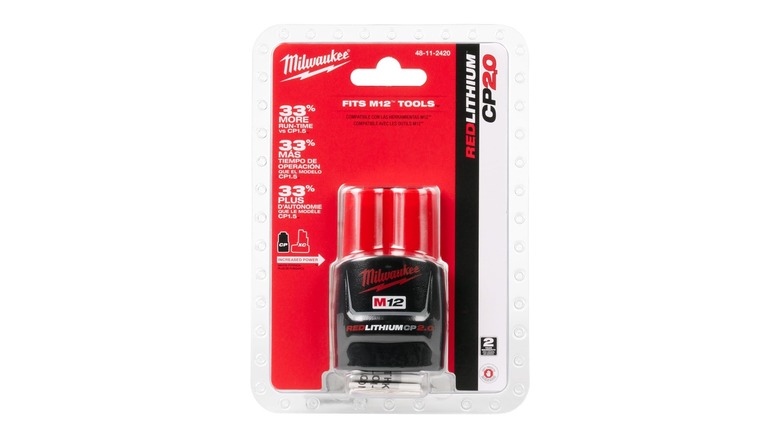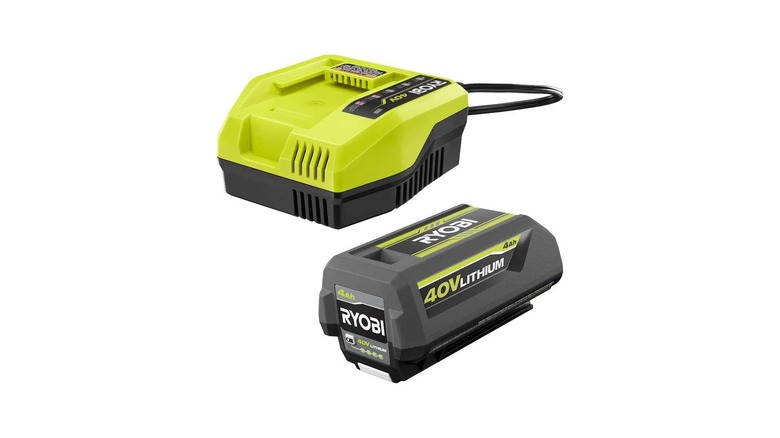How To Spot Fake Power Tool Batteries (And What To Do If Yours Is Counterfeit)
Collectively, we've come a long way when it comes to power tools, no longer being limited to being plugged into a wall or inhaling gas fumes. These days, high-powered batteries have made it possible to work with power tools without all that. But convenience doesn't always come cheap, and many bad actors are looking to fill the gap with fake power tool batteries.
Because of their combustible nature, all lithium-ion batteries are at risk of fires, even the original ones. However, there are two main differences when it comes to real and fake batteries, which really boil down to accountability and testing. When batteries come from reputable manufacturers, they are held liable for issues related to them and have things like warranty coverage in place to help protect consumers. Plus, official products hold certifications from different independent testing bodies relevant to the particular country or region. In addition, official batteries are optimized to work on not just the battery system that includes the charger, but also take into consideration their performance when used in tandem with the brand's portfolio of power tools.
Now, it's important to note that even fake batteries can work with your power tools. After all, some of them have been engineered to be able to perform similarly to authentic ones. However, how long they can continue to do so safely is not always guaranteed. So, how do you know if your power tool batteries are fake or not?
How to spot fake power tool batteries
Because there are so many power tool brands out there with varying battery systems under its portfolio, you will need to browse guidelines from the official manufacturer's website for some guidance. For example, DeWalt shares that three common ways to spot counterfeit DeWalt batteries are the screws, multiple certification logos, and spelling errors. If possible, if you have a guaranteed original one in your midst, you can compare and contrast the packaging with existing tools or even email the manufacturer for help. According to the Federal Bureau of Investigation (FBI), some other things to take note of when trying to avoid fake batteries include issues with packaging, like misspelled labels, or a lack of official manufacturing numbers.
To avoid purchasing fake batteries, it's best to take steps to protect yourself, your tools, and your home. First, you can also opt to only buy them from official retailers. For example, we've mentioned before that buying Ryobi batteries from Amazon isn't always a great idea. Aside from the possibility of counterfeits, it might be outdated, and there are also warranty problems. Second, you should avoid buying batteries secondhand, especially if you can't confirm their authenticity. While it can save you a few bucks, it may no longer be covered by warranty, be at the end of its lifespan, or have been damaged from improper storage.
What to do if your power tool battery is fake
The first thing to do once you determine that your power tool battery is fake is to stop using it. Even if it's still "working", remove it from your tool immediately to avoid any unwanted damage. Then, take video and photos of the battery from all sides, so that you have the appropriate documentation for reporting it to the relevant authorities. You'll want to store your fake lithium-ion batteries safely until you're able to properly dispose of them. While they might not operate at the same standards as the official products, they follow similar safety mechanics to other batteries, such as keeping them out of extreme temperatures. Next, you'll want to drop them off at an electronics drop-off center or bring them to your local recycling facility, wherein they are equipped to process them without causing environmental harm.
If you did buy it from a third-party seller from an online retailer, it's important to leave reviews so other potential buyers don't make the same mistake. Depending on the retailer, you can send reports of fake products, such as Amazon or Walmart. Apart from the platform you bought it from, the FBI shares that other places to make reports include STOPfakes.gov and IPRCenter.gov. If you used a credit card to make the purchase, you may also want to let your bank know about it. In some cases, they may be able to reverse the transaction.


